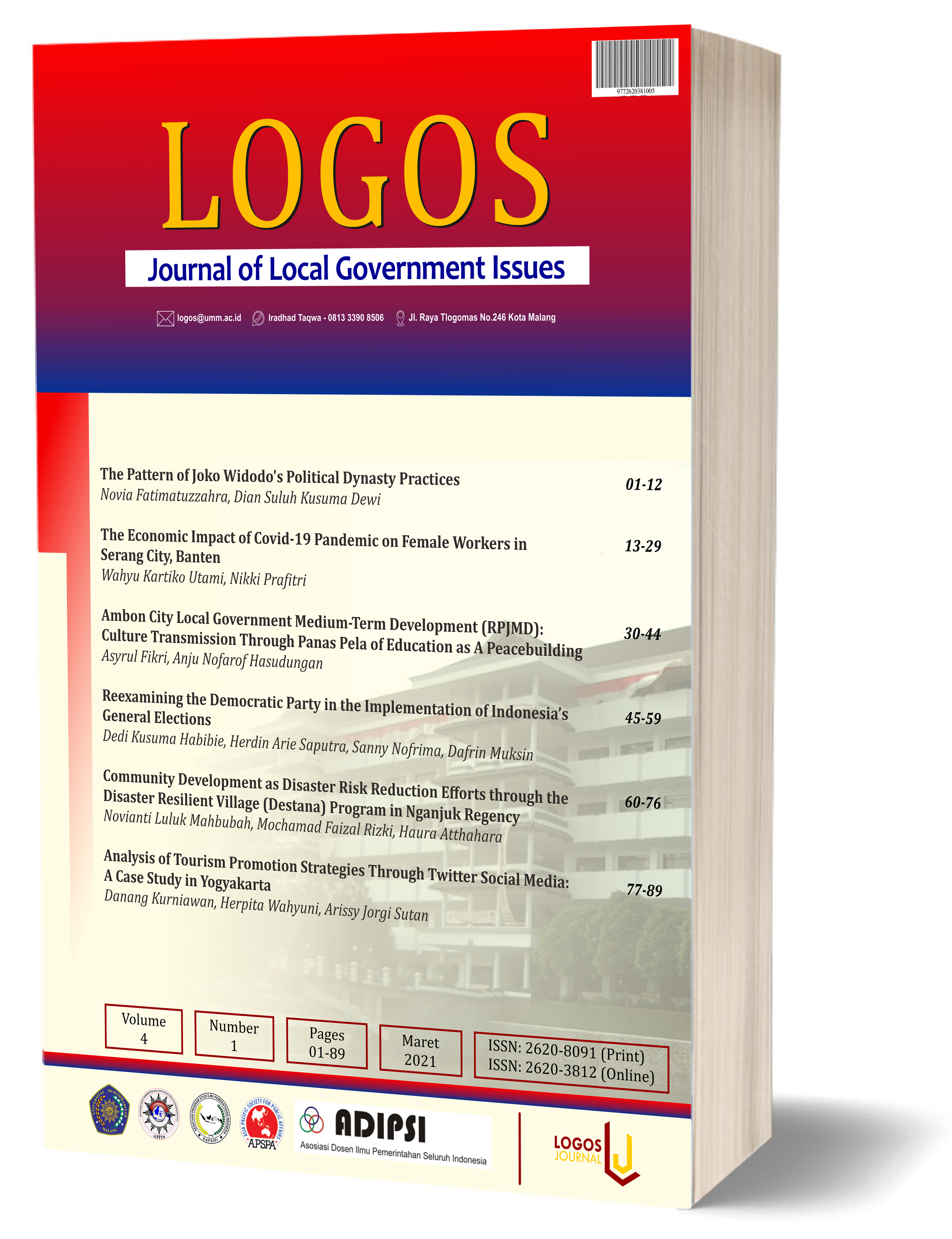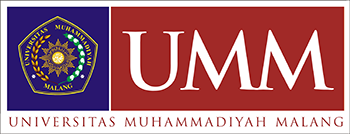Reexamining the Democratic Party in the Implementation of Indonesia’s General Elections
DOI:
https://doi.org/10.22219/logos.v4i1.14853Keywords:
Democracy, Evaluation, Local elections, Regional AutonomyAbstract
Direct elections (Pilkada) are part of democracy; it shows a clear orientation, where the positioning and interests of the people are at the highest level in politics so far. This study aims to analyze some of the main problems in the implementation of regional elections in Indonesia. This type of research used in this research is qualitative research. Analyzes were performed using the Nvivo 12 plus software. In data collection, this research was conducted through literature studies or focused on secondary data in journals and well-known online media news. The result of this research is that the direct regional election cannot be separated from various problems, such as the size of political capital, the weak role of political parties, the existence of interests, oligarchs, political dynasties, money politics, and intimidation of state civil servants (ASN). Pilkada immediately seemed to be dominated by elite groups with established modalities not to provide public space to participate
Downloads
References
Akbar, P., & Purnomo, E. P. (2019). Model Dinasti Politik Di Kota Bontang. JWP (Jurnal Wacana Politik), 4(2), 145-156. http://dx.doi.org/10.24198/jwp.v4i2.25381
Alamsyah, M. N. (2014). Fenomena Electocracy dalam Pilkada Langsung di Indonesia. Academica, 4(1), 761-773.
Aminuddin, M. F., & Attamimi, N. H. (2019). From Retail to Grocery: Money Politics in 2014 Indonesian Legislative Election. Politik Indonesia: Indonesian Political Science Review, 4(1), 99-120. https://doi.org/10.15294/ipsr.v4i1.12609
Azmi, K. S. A., & Zainudin, R. (2020). Money in Politics: a Recipe for Corruption in Malaysia. Journal of Financial Crime. https://doi.org/10.1108/JFC-07-2020-0147
Bakar, A. (2016). Politi Dinasti dan Pelembagaan Partai Politik Pengalaman DPC PDIP dan Keluarga Banteng di Kepulauan Selayar. Al Daulah: Jurnal Hukum Pidana dan Ketatanegaraan, 2(1), 105-119. https://doi.org/10.24252/ad.v2i1.1428
Bimantara, N., & Harsasto, P. (2018). Analisis politik dinasti di kabupaten kediri. Journal of Politic and Government Studies, 7(04), 201-210. https://ejournal3.undip.ac.id/index.php/jpgs/article/view/21909
Chaniago, P. S. (2016). Evaluasi Pilkada Pelaksanaan Pilkada Serentak Tahun 2015. Politik Indonesia: Indonesian Political Science Review, 1(2), 196-211. https://doi.org/10.15294/jpi.v1i2.6585
Darmansyah, R., Syahrani, S. D., & Harirah, Z. (2020). Potret Dinasti Politik dalam Pengisian Jabatan Administratif. Journal of Political Issues, 2(1), 34-46. https://doi.org/10.33019/jpi.v2i1.28
Delmana, L. P., Zetra, A., & Koeswara, H. (2020). Problematika Dan Strategi Penanganan Politik Uang Pemilu Serentak 2019 Di Indonesia. Tata Kelola Pemilu Indonesia, 1(2), 1-20. https://doi.org/10.46874/tkp.v1i2.61
Djati, W. R. (2014). Revivalisme Kekuatan Familisme dalam Demokrasi: Dinasti Politik di Aras Lokal. Masyarakat: Jurnal Sosiologi, 18 (2) 203-231. https://doi.org/10.7454/mjs.v18i2.3726
Firnas, M. A. (2016). Politik Dan Birokrasi: Masalah Netralitas Birokrasi Di Indonesia Era Reformasi. JRP (Jurnal Review Politik), 6(1), 160-194. Retrieved from http://jurnalfuf.uinsby.ac.id/index.php/JRP/article/view/1125
Fitriani, L. U., Karyadi, L. W., & Chaniago, D. S. (2019). Fenomena Politik Uang (Money Politic) Pada Pemilihan Calon Anggota Legislatif di Desa Sandik Kecamatan Batu Layar Kabupaten Lombok Barat. RESIPROKAL: Jurnal Riset Sosiologi Progresif Aktual, 1(1), 53-61. https://doi.org/10.29303/resiprokal.v1i1.5
Fitriyah, F. (2020). Partai Politik, Rekrutmen Politik dan Pembentukan Dinasti Politik pada Pemilihan Kepala Daerah (Pilkada). Politika: Jurnal Ilmu Politik, 11(1), 1-17. https://doi.org/10.14710/politika.11.1.2020.1-17
Fitriyah, M. (2012). Fenomena Politik Uang dalam Pilkada. Politika: Jurnal Ilmu Politik, 3(1), 5-14. https://doi.org/10.14710/politika.3.1.2012.5-14
Frensiska, R. (2015). PERUBAHAN SISTEM PEMILIHAN KEPALA DAERAH: Implikasi terhadap Calon Perseorangan dalam Perspektif Hak Asasi Manusia. Jurnal Rechts Vinding: Media Pembinaan Hukum Nasional, 4(1), 105-122. http://dx.doi.org/10.33331/rechtsvinding.v4i1.50
Hanafi, R. I. (2016). Pemilihan Langsung Kepala Daerah di Indonesia: Beberapa Catatan Kritis Untuk Partai Politik. Jurnal Penelitian Politik, 11(2), 1-16. https://doi.org/10.14203/jpp.v11i2.197
Hikmat, M. M. (2014). Pemetaan Masalah dan Solusi Konflik Lokal dalam Pilkada Langsung di Indonesia. MIMBAR: Jurnal Sosial dan Pembangunan, 30(1), 18-27. https://doi.org/10.29313/mimbar.v30i1.437
Kukuh Hendrayanto, M. (2008). Evaluasi Pilkada Langsung (Studi di Komisi Pemilihan Umum di Kabupaten Ngawi). Thesis :University of Muhammadiyah Malang.
Ma’riyah, C. (2012). Menggugat Politik Dinasti Dalam Pemerintahan Indonesia. Jurnal Ilmu Pemerintahan, 36, 1-19.
Maemunah, M., & Masita, M. (2016). Praktek Politik Uang Pada Pemilukada Serentak 2015 (Studi Kasus di Desa Simpasai Kecamatan Lambu Kabupaten Bima). CIVICUS: Pendidikan-Penelitian-Pengabdian Pendidikan Pancasila dan Kewarganegaraan, 4(1), 21-26. https://doi.org/10.31764/civicus.v4i1.321
Moleong, L. J. (2006). Metodologi Penelitian Kualitatif. Bandung: PT Remaja Rosdakarya.
Muhtadi, B. (2019). Politik uang dan new normal dalam pemilu paska-orde baru. Integritas: Jurnal Antikorupsi, 5(1), 55-74. https://doi.org/10.32697/integritas.v5i1.413
Muksin, D., Purwaningsih, T., & Nurmandi, A. (2019). Praktik Dinasti Politik Di Aras Lokal Pasca Reformasi: Studi Kasus Abdul Gani Kasuba Dan Ahmad Hidayat Mus Pada Pilkada Provinsi Maluku Utara. JWP (Jurnal Wacana Politik), 4(2), 133-144. https://doi.org/10.24198/jwp.v4i2.25336
Nabila, N., Prananingtyas, P., & Azhar, M. (2020). Pengaruh Money Politic Dalam Pemilihan Anggota Legislatif Terhadap Keberlangsungan Demokrasi Di Indonesia. Notarius, 13(1), 138-153. https://doi.org/10.14710/nts.v13i1.29169
Nge, H. J. (2018). Oligarki Partai Politik dalam Rekrutmen Calon Kepala Daerah. Jurnal Academia Praja, 1(01), 59-84. https://doi.org/10.36859/jap.v1i01.42
Nugraha, A., & Mulyandari, A. (2016). Pilkada Langsung Dan Pilkada Tidak Langsung Dalam Perspektif Fikih Siyasah. Mazahib, 15(2), 208-236. https://doi.org/10.21093/mj.v15i2.630
Prianto, B. (2016). Partai Politik, Fenomena Dinasti Politik dalam Pemilihan Kepala Daerah, dan Desentralisasi. Publisia: Jurnal Ilmu Administrasi Publik, 1(2), 105-117. https://doi.org/10.26905/pjiap.v1i2.436
Purwaningsih, T., & Widodo, B. E. C. (2020). The Interplay of Incumbency, Political Dynasty and Corruption in Indonesia: Are Political Dynasties the Cause of Corruption in Indonesia? Revista UNISCI 18 (53), 157-176. https://www.researchgate.net/deref/http%3A%2F%2Fdx.doi.org%2F10.31439%2FUNISCI-89
Putri, M. I. D., Arifani, N., Auliavia, M. V., & Nuriyah, S. (2020). Politik dan Tradisi: Politik Uang dalam Pemilihan Kepala Desa. Jurnal ISIP: Jurnal Ilmu Sosial dan Ilmu Politik, 17(2), 72-81. http://dx.doi.org/10.36451/j.isip.v17i2.46
Rochayati, N. (2017). Dinamika Demokrasi Lokal Di Asia Tenggara: Desentralisasi, Pilkada, Dan Konflik Kekerasan di Indonesia Dan Filipina. Global: Jurnal Politik Internasional, 10(2).
Saputra, H. A., Setiawan, A., Nofrima, S., & Muksin, D. (2021). Political Conflict on the Results of Recapitulation in Regional Head Elections in North Borneo Province in 2015. ARISTO, 1(1), 1-23.
Saputro, D., & Erni Zuhriyati. (2018). Perkembangan Money Politik Di Pilkada Tahun 2018 di Kabupaten Ponorogo. Prosiding Konferensi Nasional Ke-8 Asosiasi Program Pascasarjana Perguruan Tinggi Muhammadiyah (APPPTMA).
Siboy, A. (2020). Desain Penguatan Kualitas Politik Dinasti dalam Pemilihan Kepala Daerah. Keadilan, 18(2), 142-163. https://dx.doi.org/10.37090/keadilan.v18i2.311
Sirait, M. Z., Noak, P. A., & Azhar, M. A. (2020). Modalitas Dalam Keterpilihan Kandidat Pada Pemilu Legislatif 2014. E-Jurnal Politika, 1(2), 10-10. https://ojs.unud.ac.id/index.php/politika/article/view/62871
Sudrajat, T., & Hartini, S. (2017). Rekonstruksi Hukum atas Pola Penanganan Pelanggaran Asas Netralitas Pegawai Negeri Sipil. Mimbar Hukum-Fakultas Hukum Universitas Gadjah Mada, 29(3), 445-460. Retrieved from https://ojs.unud.ac.id/index.php/politika/article/view/62871
Sudrajat, T., Hartini, S., & Kadarsih, S. (2014). Kebijakan Netralitas Politik Pegawai Negeri Sipil dalam Pemilukada (Studi di Jawa Tengah). Padjadjaran Journal of Law, 1(3), 537-557. https://doi.org/10.22304/pjih.v1n3.a7
Sugiyono, S. (2018). Metode Penelitian Kualitatif untuk Penelitian yang Bersifat: Eksploratif, Enterpretif, Interaktif dan Konstruktif. Bandung: CV. Alfabeta.
Suparno, S. (2018). Pemilihan Kepala Daerah Langsung Kelebihan dan Kekurangannya. Mimbar Administrasi FISIP UNTAG Semarang, 13(18), 1-8.
Susanti, M. H. (2017). Dinasti Politik dalam Pilkada di Indonesia. Journal of Government and Civil Society, 1(2), 111-119. http://dx.doi.org/10.31000/jgcs.v1i2.440
Sutisna, A. (2017). Gejala proliferasi dinasti politik di Banten era kepemimpinan gubernur Ratu Atut Chosiyah. Politik Indonesia: Indonesian Political Science Review, 2(2), 100-120. https://doi.org/10.15294/jpi.v2i2.9329
Suyatno, S. (2016). Pemilihan Kepala Daerah (Pilkada) dan Tantangan Demokrasi Lokal di Indonesia. Politik Indonesia: Indonesian Political Science Review, 1(2), 212-230. https://doi.org/10.15294/jpi.v1i2.6586
Syafril, R. (2020). Politik Dinasti dalam Pandangan Islam. JESS (Journal of Education on Social Science), 4(1), 125-135. https://doi.org/10.24036/jess.v4i1.256
Syahbandir, M., Hasan, E., & Izwar, I. (2019). A Political Dynasty in Nagan Raya District. Paper presented at the 1st Aceh Global Conference (AGC 2018). https://dx.doi.org/10.2991/agc-18.2019.38
Syamsuryadin. (2016). Pemilihan Kepala Daerah Secara Langsung Dengan Sistem Noken di Papua. Research Reports: Universitas Pancasila
Downloads
Published
How to Cite
Issue
Section
License
Copyright (c) 2021 Dedi Kusuma Habibie, Herdin Arie Saputra, Sanny Nofrima, Dafrin Muksin

This work is licensed under a Creative Commons Attribution-ShareAlike 4.0 International License.
Authors who publish with this journal agree to the following terms:
- Authors retain copyright and grant the journal right of first publication with the work simultaneously licensed under a Creative Commons Attribution-ShareAlike 4.0 International License. that allows others to share the work with an acknowledgment of the work's authorship and initial publication in this journal.
- Authors are able to enter into separate, additional contractual arrangements for the non-exclusive distribution of the journal's published version of the work (e.g., post it to an institutional repository or publish it in a book), with an acknowledgment of its initial publication in this journal.
- Authors are permitted and encouraged to post their work online (e.g., in institutional repositories or on their website) prior to and during the submission process, as it can lead to productive exchanges, as well as earlier and greater citation of published work (See The Effect of Open Access).

This work is licensed under a Creative Commons Attribution-ShareAlike 4.0 International License.













